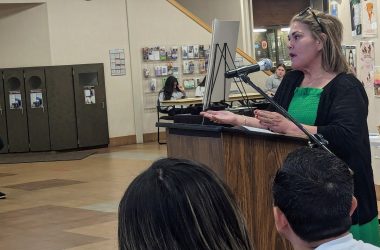
School board candidates David Salinas (top left), Satya Chandragiri, Raul Marquez, Marty Heyen, Danielle Bethell and Chuck Lee.
With three weeks to go until the election, candidates are spending tens of thousands of dollars in hopes of winning a seat on the Salem-Keizer School Board and drawing major supporters largely along partisan lines.
Conservative groups, including Oregon Right to Life and the Marion County Republicans, have lined up behind Marty Heyen, who’s seeking re-election in zone 2, Satya Chandragiri, who’s competing for an open seat in zone 4, and Danielle Bethell, who’s running in zone 6.
Liberal causes, including Progressive Salem, and organized labor, including educator unions, have backed Raul Marquez in zone 2 and David Salinas in zone 4.
Chuck Lee, the longest-serving member of the board, who’s seeking a fourth term in zone 6, is an exception, with major campaign support from Mountain West Investment Corp., his employer, as well as Progressive Salem, United Food and Commercial Workers and Bud Pierce, former Republican candidate for governor.
Bethell, his opponent and the Keizer Chamber of Commerce director, has also received significant support from local businesses.
Ballots for the race will be delivered starting May 2 and must be received May 21. Though candidates must live in the zone they’re seeking to represent, all voters in the district vote for all seats on the board.
Jim Green, who currently holds the zone 4 seat, is also executive director of the Oregon School Boards Association. He said school board races have been getting more expensive and political across the state, with interest groups with no clear interest in education seeking to influence candidates.
Green hasn’t endorsed anyone in the race between Chandragiri and Salinas and said he doesn’t plan to because of his work for the association, which supports boards across the state.
He’s skeptical both of groups with no direct tie to education getting involved in elections and claims that any particular agenda is trying to “take over” local school boards.
Board seats are nonpartisan and so are most board decisions, Green said.
He noted that board decisions, like the recent Salem-Keizer boundary adjustments, can be deeply unpopular with the public.
“People are spending an inordinate amount of money” to get elected to “an unpaid volunteer position where people are yelling at you,” he said.
The most expensive race has been in zone 4.
Salinas, an electrician and Sprague High School parent, has received more than $21,000 in cash and in-kind support, mostly from unions, including $500 from the Oregon Education Association.
Salinas, who started his career through an apprenticeship with the International Brotherhood of Electrical Workers, said those contributions were driven by interviews with union leaders, who asked him about his values. None suggested an interest in influencing board policy, he said.
“I’ve always been a union supporter,” he said. “I don’t expect that they’re going to give me input or have any influence on my decisions.”
Chandragiri, a psychiatrist, has raised about $13,000, much of it from individual donors, though Oregon Right to Life is his single largest contributor with $2,667 in in-kind support.
Chandragiri, who ran unsuccessfully for state representative as a Republican last year, said he’s never made a secret of being pro-life. In a statement, he wrote he supports sex education “consistent with the values of my constituents, families and parents who send their children to our public schools,” and believes it’s important to teach about contraceptives to prevent pregnancy and sexually transmitted diseases.
Such issues rarely come before school boards in Oregon. Sex education standards are set by state law, and individual parents can review curriculum in their child’s school and keep their child out of instruction.
“I haven’t voted on an abortion issues on the school board since I’ve been there,” Green said. “I have never, ever had a parent talk to me individually about our health curriculum.”
Heyen, who also received $2,667 from Right to Life this year and was backed by the group during her 2015 campaign, said Right to Life has never pressed her to adopt its viewpoint on an issue before the board.
Chandragiri said his focus is on preventing suicide and improving mental health in schools.
“This is a nonpartisan race and I want it that way,” he said.
Lois Anderson, executive director of Oregon Right to Life, said the group is planning other support for its three endorsed Salem-Keizer candidates as the May 21 election approaches.
In 2017, the group spent a total of about $44,000 on three Salem-Keizer school board races, Anderson said, much of it in independent expenditures through a mailing the group produced that called the race a “critical election for the unborn.”
Its political action committee contributed to candidates Kathy Goss, Jesse Lippold and Jonathan Baker, and funded the bulk of Lippold’s successful campaign. Goss was also elected, and Baker lost to board director Sheronne Blasi.
Anderson said the Right to Life political action committee became interested in school board elections during the 2011-12 school year, when a concerned parent reached out about Planned Parenthood teaching sex education at two local high schools.
That teaching was through a state grant which the Salem-Keizer School Board and district had no say in.
But Anderson said parents were concerned about Planned Parenthood staff collecting personal information from students, and it showed Right to Life supporters the importance of having pro-life leaders on school boards.
“That really sparked our attention statewide for school boards,” she said. Salem-Keizer has remained a focus since then, she said, in part because Right to Life is based in Keizer and has engaged local parents.
The group’s primary goal with Salem-Keizer candidates is defensive, ensuring Planned Parenthood doesn’t return to local schools, she said. There has been no Planned Parenthood presence in any local schools since 2015, district spokeswoman Lillian Govus said.
Though board members typically aren’t involved in approving district contracts, Anderson said a board member would be able to raise concerns.
More broadly, the group is invested in having visible pro-life leaders.
“There is a general principle for all of us that are involved in this movement that someone who holds pro-life values is a valuable voice,” she said. That includes supporting existing district programs to help pregnant and parenting teens.
If Heyen keeps her seat in this race and either Bethell or Chandragiri is elected, the board would have a majority of Right to Life backed candidates, but Anderson said there’s no plan at play if that happens.
“They disagree really strongly about other things – it’s not like they walk in lockstep,” she said of Goss, Heyen and Lippold, the three Right to Life backed candidates currently on the board. “I would love to be able to say yes, there’s this big master plan from behind the scenes and we’ve been creating it this whole time, but that’s not how politics works.”
Progressive Salem has also been a player in the school board election, funding campaign mailings for Marquez, Salinas and Lee, and hosting a luncheon for their candidates. They’ve spent roughly $8,460 for those three, campaign filings show.
Tina Calos, the group’s chair, said the local civic group seeks candidates with progressive values. In education, that means making sure “all kids have an opportunity to succeed.”
They were a force behind the successful re-election campaign of Salem City Councilman Tom Andersen and the election of Councilman Chris Hoy last year.
The group has been helping school board campaigns by recruiting volunteers to knock on doors. Calos said there’s no expectation that candidates would support a particular agenda. There is no issue the school board is now handling that is of particular interest to Progressive Salem, Calos said.
“Our philosophy is you find a person with a good work ethic, high integrity, good values, put them in office and you trust them,” she said.
Marquez, Salinas and Lee also drew the endorsement of Salem-Keizer’s two employee unions, the Salem-Keizer Education Association, which represents teachers, counselors and other licensed staff, and the Association of Salem-Keizer Education Support Professionals, which represents instructional assistants and other classified staff.
Rita Glass, president of the classified union, said those decisions were made after interviews with every candidate.
Marquez received $2,000 from the Oregon Education Association, while Salinas and Lee each got $500. Such contributions are requested by local educator unions, OEA spokeswoman Jenny Smith said.
The district is due to negotiate new contracts with both unions during the next board term, though candidates said those discussions didn’t come up in endorsement meetings.
Marquez said he supports better education funding from the state and has focused his campaign on bringing families and students who feel they don’t have a voice in district decisions to the table.
“As a recent graduate I know what it’s like to go through the system,” he said.
Correction: This article originally misspelled Councilman Tom Andersen’s last name.
Reporter Rachel Alexander: [email protected] or 503-575-1241.
Follow Salem Reporter on FACEBOOK and on TWITTER.
YOUR SUBSCRIPTION WOULD HELP — Salem Reporter relies almost exclusively on reader subscriptions to fund its operations. For $10 a month, you hire our entire news team to work for you all month digging out the news of Salem and state government. You get breaking news alerts, emailed newsletters and around-the-clock access to our stories. We depend on subscribers to pay for in-depth, accurate news. Help us grow and get better with your subscription. Sign up HERE.

Rachel Alexander is Salem Reporter’s managing editor. She joined Salem Reporter when it was founded in 2018 and covers city news, education, nonprofits and a little bit of everything else. She’s been a journalist in Oregon and Washington for a decade. Outside of work, she’s a skater and board member with Salem’s Cherry City Roller Derby and can often be found with her nose buried in a book.









